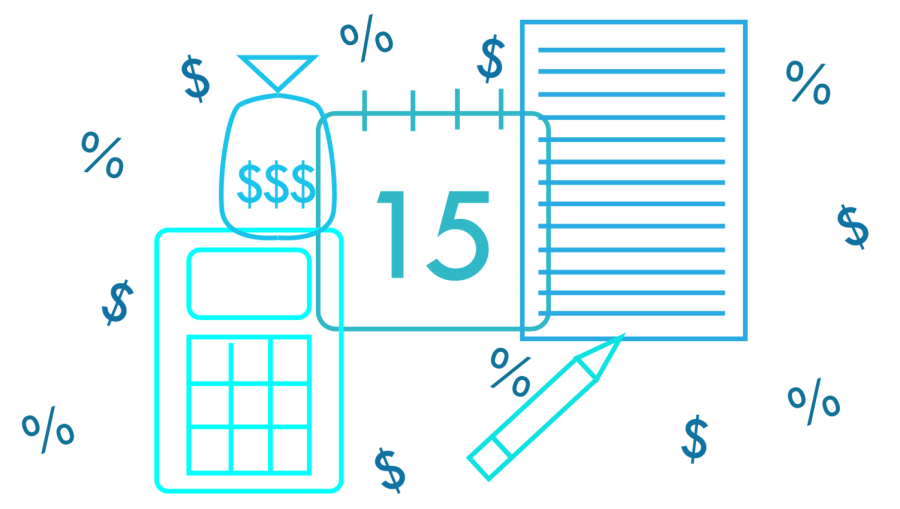Cushman: U.S. Anti-Tax Rhetoric Blocks Good Tax Policy
(Graphic by Claire Peterson | The Daily Utah Chronicle)
November 19, 2021
As a kid, my parents prepared their tax forms every tax season and always complained about the same thing. They constantly told me how much I would hate taxes when I grew up, and that taxes were only bad because they had to be paid. This narrative informed my earliest thoughts about politics. But as an adult, I’ve realized the problems with demonizing all taxes. The misleading assumption that taxes are inherently burdensome and tyrannical prevents good policies from being adopted.
People who preached against taxes, such as Ronald Reagan, made the issue of taxation a core part of the Republican party in the 1970s. This has evolved more towards resistance to taxation for today’s Republicans. For example, Rep. Kevin McCarthy from California cautioned his followers in a tweet, saying “Democrats want to track every penny you earn so they can then tax you and your family at the maximum possible amount.” His words implied that Democrats have contrived a despicable scheme to steal money from Americans, rather than created policy to ensure everyone fully pays taxes under the law.
Former President Donald Trump has also engaged in openly tax-evasive discourse. In a debate, he bragged about dodging taxes, saying that paying little in taxes “makes me smart.”
This rhetoric has fed us the message that taxes will harm the economy, stifle American businesses and are an overall burden — and we’ve eaten it up. In response to an editorial criticizing Republicans who propagate anti-tax narratives, many people jumped into the discussion. They argued that believing in taxes means believing the government owns you and your money. One Twitter user said that “taxation is theft,” while another chimed in, saying “the only person that is entitled to the money I worked for is me.”
Many have clearly bought into anti-tax ideas, but those same ideas harm us more than we realize. Anti-tax rhetoric has opened the door for Republicans to hobble the IRS so it cannot effectively enforce taxation and limit progressive taxation. This operates under the guise that taxation as a whole is bad and anti-American.
However, a stronger IRS and a raise in taxes for America’s super-rich could largely benefit most Americans. Today’s IRS runs on archaic equipment and limited staff, resulting in fewer and less thorough audits. This has allowed much of America’s super-rich to get away with paying less than their fair share of taxes.
Some rich people don’t even file taxes, creating a $46 billion loss between 2014 and 2016 alone. Officials estimate that “a 10-year, $80 billion investment in IRS enforcement could result in an additional $700 billion dollars for the treasury.”
That much money could go a long way to support government programs we rely on, like Social Security and Medicare, both of which are rapidly running out of money. It could also create more room in the budget for those considered middle-class and low-income to pay less in taxes.
Similarly, targeting higher taxes on the wealthy could have massive benefits for our government. Tax cuts that allowed the wealthiest Americans to pay the least in taxes under the Trump administration also partially caused a $7.8 trillion rise in the national debt. But having America’s wealthy pay higher taxes could help decrease the deficit and provide funding for programs that many Republicans claim are unaffordable.
Most Americans support higher taxes for wealthy Americans, but Republicans have been able to consistently block these policy initiatives by rewriting the discussion about taxes to be anti-tax.
When we incessantly complain about taxes we are propagating ideas about taxes, which Republicans use to make the wealthy wealthier. In the meantime, national debt rises and social programs become underfunded. We become complicit in the creation of tax policy that goes against what the majority of Americans want. We certainly should criticize some taxes, while supporting others.
You and I might share an internal groan when tax season arrives and we have to gather our W-2 forms, but that doesn’t mean we should accept the narrative that Americans hate all taxes. Let’s stop engaging in the anti-tax discussion that creates the political environment anti-tax Republicans want — one which demonizes the tax policy that would benefit us.









